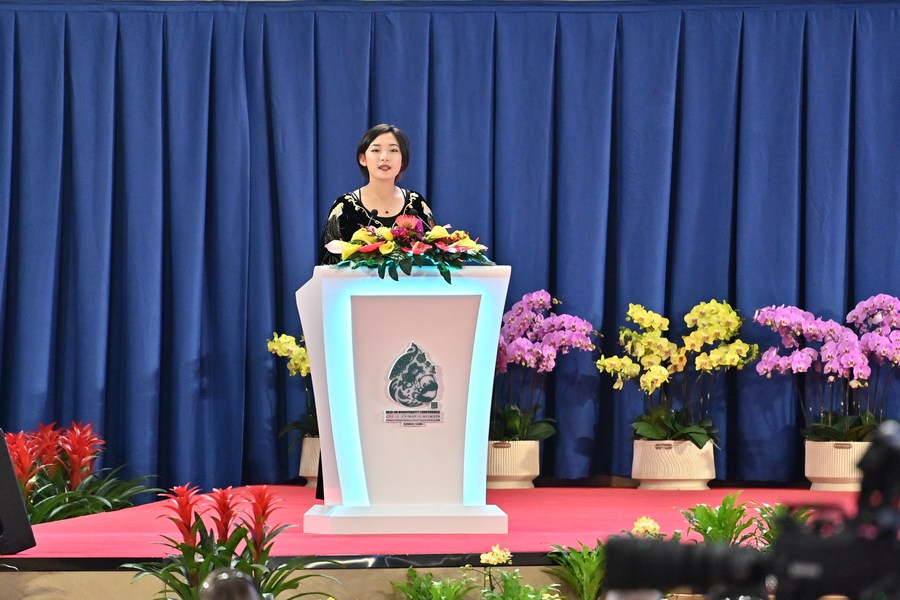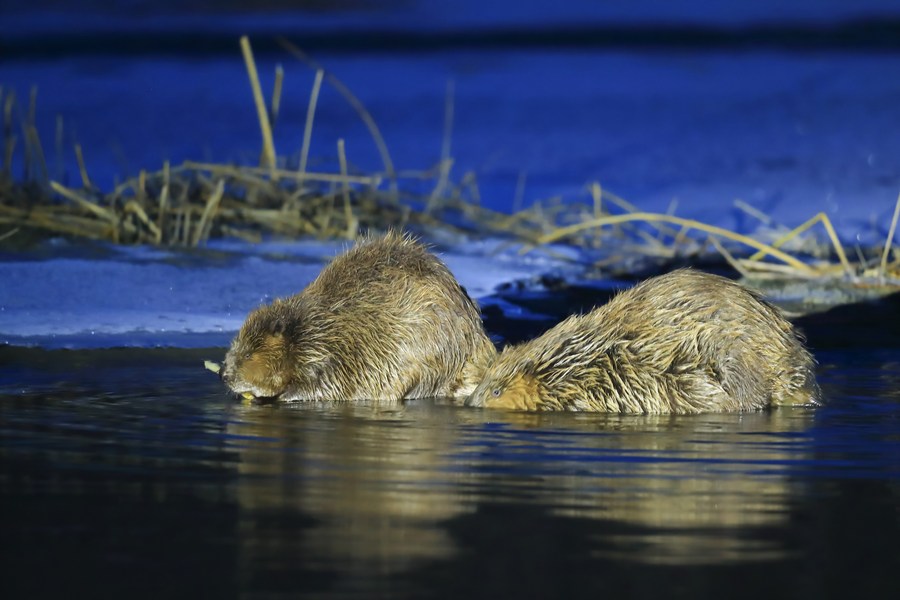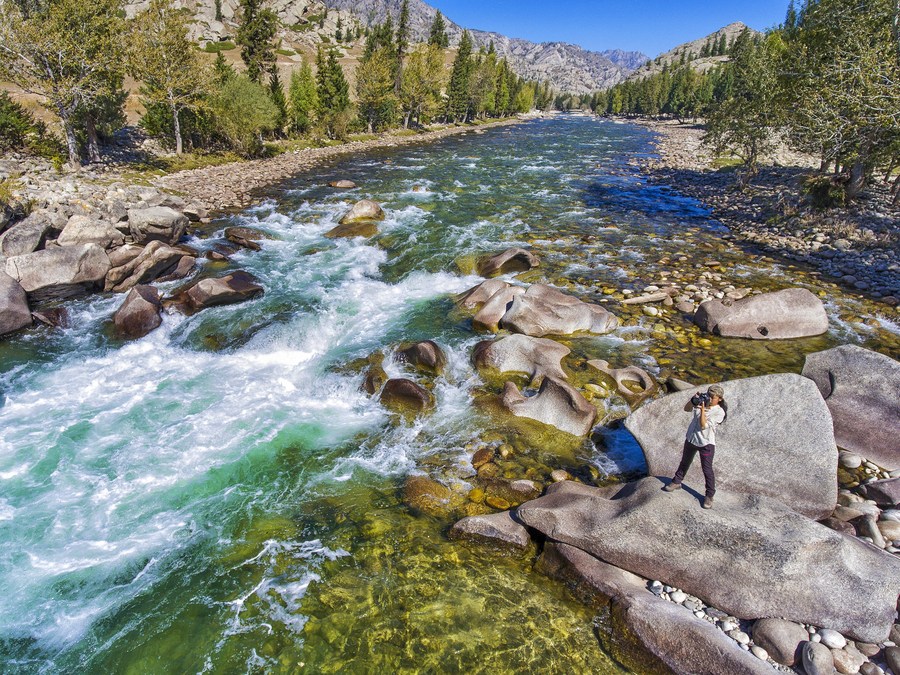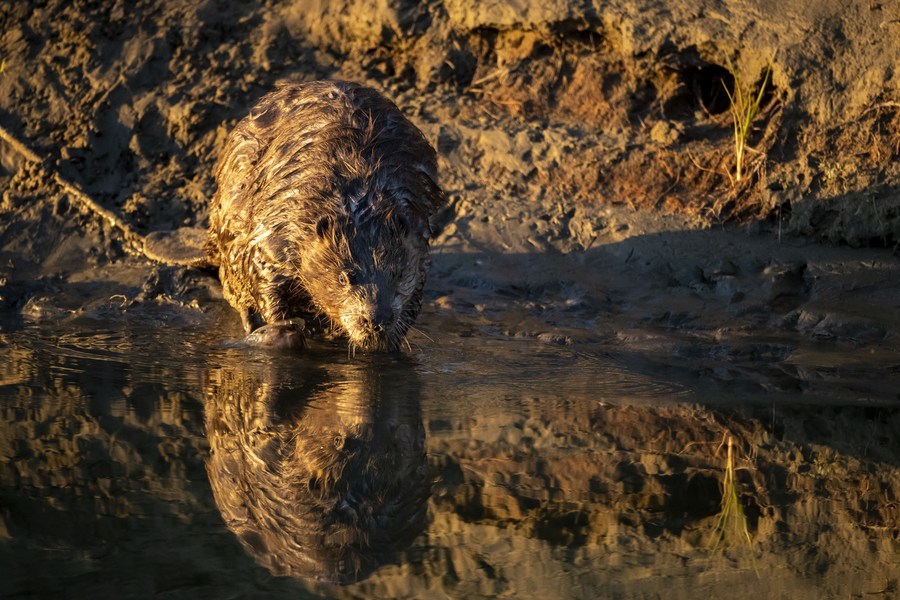
Chu Wenwen from Beijing Forestry University speaks during the opening ceremony of the 15th meeting of the Conference of the Parties to the UN Convention on Biological Diversity (COP15) in Kunming, southwest China's Yunnan Province, Oct. 11, 2021. COP15 kicked off in Kunming on Monday. (Xinhua/Li Xin)
KUNMING, Oct. 12 (Xinhua) -- Before Chu Wenwen, a wildlife conservationist from China's Xinjiang Uygur Autonomous Region, set out for Kunming, she had practiced her speech hundreds of times in front of a beaver nest.
As the youth representative to the 15th meeting of the Conference of the Parties to the United Nations Convention on Biological Diversity (COP15), Chu introduced how millions of post-1990s in China have made a difference for endangered beavers.
Listed as a first-class state-protected animal in China, Mengxin beavers are the only beaver species living in China and are found only along Ulungur River in Xinjiang's Altay Prefecture.

Undated photo shows Mengxin beavers in Altay Prefecture, northwest China's Xinjiang Uygur Autonomous Region. (Xinhua)
"With the concerted efforts of over a million young people in China, the number of beaver nests has increased from 162 to 190 over the past four years. It's a 20-percent jump for the population of the animal," she said, barely able to contain her excitement during the speech at the opening meeting on Monday.
Since Chu was 2 years old, she has been following in the footsteps of her father, who was engaged in wildlife research. She spent her whole childhood in the Altai Mountains, Xinjiang. As there were no other children in the field station, beavers, snow leopards, wild horses, lynxes, golden eagles and brown bears became her "best friends."
At seven, Chu got her first SLR camera. She has since taken innumerable pictures while following her father in his environmental protection work.

Undated photo shows Chu Wenwen, a wildlife conservationist, filming beavers in northwest China's Xinjiang Uygur Autonomous Region. (Xinhua)
In 2015, she established a nature photography studio and has taken more than 75,000 video clips and photos of precious wildlife. The next year, she registered a nature conservation association, focusing her work on beavers.
Mengxin beaver is a species that can improve the ecological environment. They build dams that become small habitats for fish and birds and attract more species such as small beasts and insects. Therefore, each beaver dam provides a new habitat for wild animals and helps to improve biodiversity levels, Chu told Xinhua.
In 2017, Chu graduated from university in Beijing, and unlike most of her classmates who chose to stay, she went back to her hometown out of love for nature.
"In the beginning, I often saw beavers die from fighting for habitats in the Ulungur River. They are very strict about their habitats, and they will only nest in areas with abundant food," she said. "Willow shrub is their most important food source, but it was dwindling in the area at the time."

Undated aerial photo shows Chu Wenwen, a wildlife conservationist, filming beavers in northwest China's Xinjiang Uygur Autonomous Region. (Xinhua)
In 2018, she initiated the beaver canteen program, which attracted over 1 million internet users to donate their snack money.
A super-canteen of about 400,000 willow shrubs was built with the snack money from those post-1990s and even post-2000s netizens. She was called "princess beaver" by her followers on social platforms.
One willow shrub could be purchased for the same price as a can of cola, six for the price of a cup of coffee and up to ten shrubs could be purchased for the price of a fried chicken meal, Chu explained.

Undated photo shows a Mengxin beaver in Altay Prefecture, northwest China's Xinjiang Uygur Autonomous Region. (Xinhua)
Also in the year, her nature conservation association gained the official recognition of the local government and was upgraded to the nature conservation association of Altay.
The association initiated the "beaver guardian" project, which trained and hired local herders from 190 households as conservation patrollers. In order to save the lives of injured wild animals, they launched the "beaver ark" project with the support of the local government. This upcoming winter, a professional wildlife rescue center in the Altai Mountains will begin operation.
"I am lucky to live in such a great era when young people can fulfill their aspirations while the country strongly supports nature conservation," she said.








